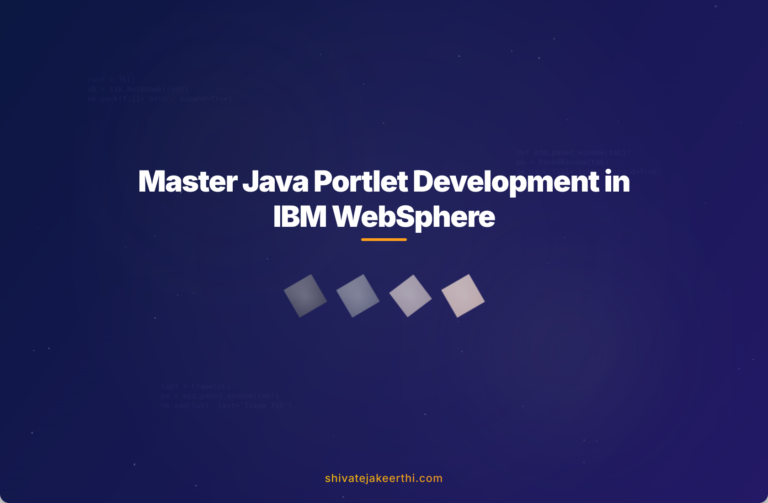Java portlet development, especially when combined with IBM WebSphere Portal Server, enables developers to build dynamic and modular web applications. While learning Java portlets might seem challenging initially, knowing the right resources makes the process much smoother and more effective.
Mastering Java Portlet Development on WebSphere
For starters, Java portlets are interactive components built using the Java programming language. They run within web portals and perform specific tasks independently or in collaboration with other portlets.
Each Java Portlet goes through a lifecycle consisting of phases such as initialization, rendering, action processing, and destruction. Understanding this lifecycle allows developers to execute tasks at appropriate times, enhancing efficiency.
To master Java Portlets on WebSphere, you first need to grasp basics like render methods (doView, doEdit) and processAction. Once comfortable with this, it’s easier to move onto more complex parts.
Building efficient Java portlets involves more than just basic methods. A solid knowledge of project structure and best practices is vital. Organizing your project clearly—such as grouping related components logically—helps teams maintain and scale the application down the line.
Additionally, Java portlets should adhere to loose coupling principles. Loose coupling ensures components are interdependent as little as possible, allowing for easier changes without affecting other parts. Using design patterns such as MVC and Singleton often helps achieve this.
Communication between portlets, termed Inter-portlet Communication (IPC), plays a major role in creating complex and interactive portal applications. For instance, when a user selects a record from one portlet, another portlet automatically displays relevant details through IPC, enhancing the user experience significantly.
Managing redirection properly within portlets ensures users are guided intuitively through the portal. Using methods like response.sendRedirect() properly within portlet actions and render phases streamlines user navigation throughout your portal applications.
Sometimes multiple smaller portlets can be confusing, giving the application a fragmented feel. Integrating them wisely into one cohesive application provides users with a seamless navigation experience. Grouping related portlets strategically or embedding portlets logically within page layouts achieves this clarity effectively.
Finally, using powerful frameworks like Spring can drastically simplify portlet development. When you implement Spring portlets, you leverage robust features like dependency injection, simplified data binding, and MVC structure to streamline your overall workflow.
Best Resources for Mastering Java Portlet Development on WebSphere
Learning resources can expedite your portlet development skills significantly. These essential resources can guide you from basic concepts to advanced techniques.
Online Tutorials and Courses
The first important resource category is online tutorials and courses. Websites like IBM DeveloperWorks, TutorialsPoint, and Java Code Geeks offer useful Java Portlet tutorial sections filled with practical examples specific to IBM WebSphere.
IBM DeveloperWorks specifically includes deep-dive articles tailored for WebSphere Portal Server, covering installation tips, advanced portlet communication, security, and performance optimization. Additionally, they often provide free downloadable PDF manuals and hands-on labs that help solidify understanding practically.
Other online educational platforms such as Udemy and Pluralsight have certified online courses, video tutorials, and guided lessons. Choosing reputable courses that offer certification can boost your resume and reinforce your practical experience.
WebSphere-specific resources are especially important since IBM’s implementation of portlets includes unique considerations. Thus, IBM’s official WebSphere documentation will always be an invaluable resource to bookmark, as it outlines best practices, guides on server configuration, detailed APIs, and the latest developments.
Books on Java Portlet Development
Books often provide comprehensive coverage you won’t find in brief tutorials. Pairing online resources with good textbook material helps solidify your theoretical understanding.
Some highly recommended books include:
- “Portlet Development with WebSphere Portlet Factory” by IBM Redbooks: A comprehensive guide specifically tailored to WebSphere users, explaining portlet lifecycle, deployment practice, and practical examples comprehensively.
- “Practical Liferay: Java-based Portal Applications Development” by Poornachandra Sarang: Although focusing mainly on Liferay, the concepts apply easily to WebSphere portlet development, articulating clear explanations of standards-compliant Java portlets.
- “Mastering IBM WebSphere Portal” by Ron Ben-Natan: This book reveals performance optimization techniques, security practices, and effective portlet deployment strategies essential for skilled developers.
These books are available via Amazon, O’Reilly Online Library, or directly from publisher sites.
Forums and Communities for Troubleshooting Complex Issues
Sometimes a developer’s greatest resource is another person who has faced the same challenge. Forums and communities like Stack Overflow, Reddit (/r/java or /r/websphere), and IBM developer forums connect you with real-world experiences shared by experienced Java and WebSphere developers.
These communities not only facilitate problem-solving but also allow you to broaden your perspective by engaging in meaningful discussions. Regularly spending time in such forums ensures gaining practical knowledge beyond textbook resources.
You may encounter technical setbacks such as tricky configuration problems or unexplained portlet errors—which are why community-driven troubleshooting resources are critical. Don’t hesitate to share your challenges clearly and politely; usually, someone has encountered and resolved a similar stumbling block.
Don’t forget that communities are reciprocal. While asking questions, take opportunities to help answer the queries of others, enriching your own understanding and network.
Continue Improving Your Java Portlet Development Skills
Becoming skilled at Java portlet development on WebSphere is an ongoing process—you constantly learn, experiment, and iterate. Starting with fundamental lifecycle methods and gradually moving to more advanced topics is key.
Practice coding regularly, experiment with various IPC methods, integrate Spring framework, and actively participate in online communities. This comprehensive approach helps you confidently tackle larger projects.
Consider maintaining a digital or physical collection of resources, build real-world applications as practical exercises, and stay engaged in forums consistently. Over time, you’ll become adept at developing powerful, efficient, and robust portlets for business-critical applications.
Ready to master Java Portlet development with WebSphere? Which resource do you plan to explore first? Share your journey or challenges in the comments—we’d love to support your Java Portlet development path together!



0 Comments